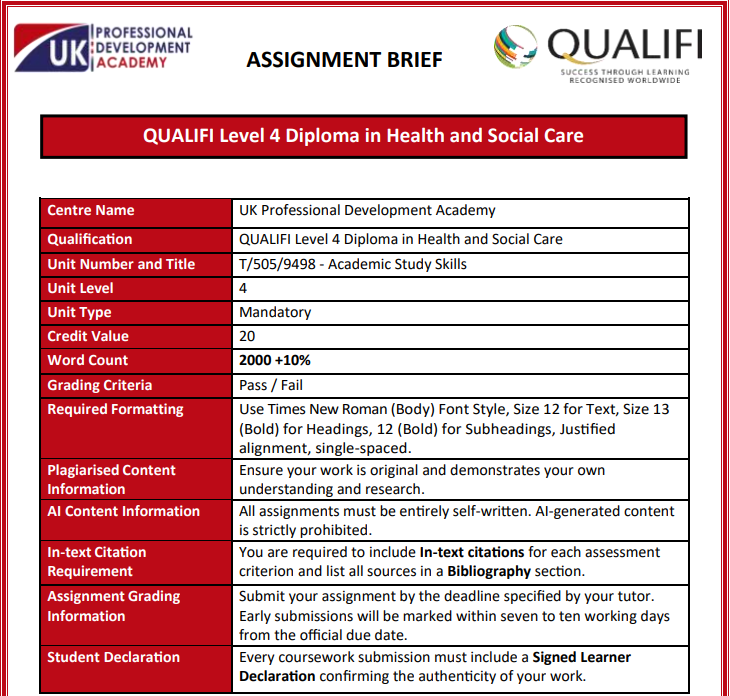| Word Count | 2000 +10% |
|---|---|
| Academic Year | 2025 |

This unit aims to enable learners to develop the necessary skills and understanding to study effectively within higher education. This will enable learners to acquire the necessary reflective and critical thinking skills required to achieve individual learning potential.
To achieve a “Pass” for this unit, learners must provide clear and sufficient evidence demonstrating that all learning outcomes have been met and that each assessment criterion has been fully addressed in accordance with the required standards.
For practical tasks, learners will be directly observed and assessed by a qualified assessor where appropriate.
LO1: Understand the causes and effects of Dementia.
LO2: Examine the investigations associated with the diagnosis of Dementia.
LO3: Examine the treatment and support available for service users with Dementia and their families.
This assignment includes both knowledge-based and skill-based criteria. Knowledge-based criteria require you to write responses in your assignment worksheet, while skill-based criteria involve carrying out practical tasks in your workplace, which will be observed.
Learners are required to address these criteria in written form using the worksheet provided.
|
LEARNING OUTCOME: |
ASSESSMENT CRITERIA: |
|
To achieve this unit, a learner must know and can: |
Assessment of these outcomes demonstrates that a learner can: |
|
LO2: Identify relevant sources of evidence to develop reliable arguments. |
2.1 Collate an annotated bibliography for 3 sources, summarising findings. 2.2 Collate an annotated bibliography for 3 sources, summarising findings. |
|
LO3: Interpret qualitative and quantitative data presented in research articles. |
3.1 Evaluate the quality of the research article provided. 3.2 Discuss the relevance of the findings to health and social care practice |
Skill-based criteria require learners to complete practical tasks within their work environment. These tasks will be assessed by a qualified assessor with expertise in the relevant field.
|
LEARNING OUTCOME |
ASSESSMENT CRITERIA |
|
To achieve this unit, a learner must know and is able to: |
Assessment of these outcomes demonstrates that a learner can: |
|
LO1: Demonstrate evidence of personal and academic development. |
1.1 Develop a portfolio of evidence showing development in academic study skills. 1.2 Reflect upon a significant learning incident using an acknowledged model |
|
Learners are required to complete practical tasks within a real workplace setting. Note: These criteria will be assessed alongside practical components from other units and must be evidenced through a Practical Evidence Portfolio. This portfolio may include direct observations, witness testimonies, reflective accounts, and relevant work products. Additionally, these tasks will be assessed separately. Your tutor will contact you when it is time for the assessment. |
|
Personal and academic development means improving how you learn, study, and reflect. It includes building skills like writing, researching, and managing your time.
A portfolio of evidence is a collection of your work that shows how your academic skills have developed. It might include assignments, feedback, and study notes.
Reflecting on a learning incident means thinking about something you learned. Use a model like Gibbs’ or Kolb’s to explain what happened, how you felt, and what you learned.
Relevant sources of evidence are reliable materials, like books or journal articles, that support your arguments. These sources should be recent, accurate, and trustworthy.
An annotated bibliography means listing your sources and adding a short summary for each. Explain what the source says and how it’s useful to your work.
Identifying sources means learning how to search for and choose good-quality information for your assignments. This helps you avoid using weak or unreliable material.
Qualitative data is information in words, like interview answers. Quantitative data is in numbers, like statistics or survey results.
Evaluating a research article means checking how strong and trustworthy the research is. Look at the methods used, the size of the study, and how clear the results are.
The relevance of findings means explaining how the results of research apply to health or social care. It shows why the research matters in real life.
Get the Solution of this T/505/9498 Assessment
Order Non-Plagiarized AssignmentAre you having trouble completing your T/505/9498 Academic Study Skills? Our Assignment Help service is the best for you. You can even check our free assignment samples before placing your order. We promise on-time delivery and 24/7 support, no matter your academic needs. From Business Management to technical subjects, we cover it all.
Hire Assignment Helper Today!
Let's Book Your Work with Our Expert and Get High-Quality Content
